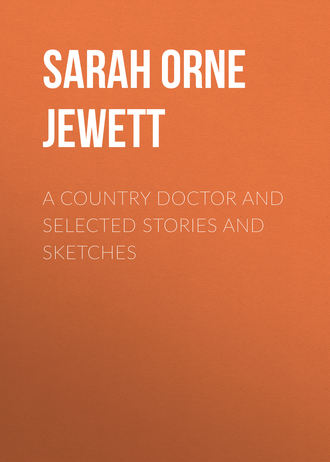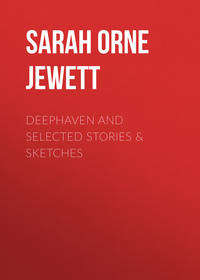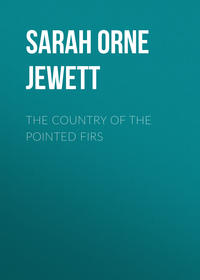 полная версия
полная версияA Country Doctor and Selected Stories and Sketches
But Dr. Leslie greeted her most cheerfully, giving her the reins when she had climbed into the wagon, and they talked of the weather and of the next day's plans as they drove home together. The girl felt a sense of guilt and a shameful lack of courage, but she was needlessly afraid that her happiness might be spoiled by a word from that quarter.
That very evening it was raining outside, and the doctor and Nan were sitting in the library opposite each other at the study-table, and as they answered some letters in order to be ready for the early morning post, they stole a look at each other now and then. The doctor laid down his pen first, and presently, as Nan with a little sigh threw hers into the tray beside it, he reached forward to where there was one of the few uncovered spaces of the dark wood of the table and drew his finger across it. They both saw the shining surface much more clearly, and as the dusty finger was held up and examined carefully by its owner, the girl tried to laugh, and then found her voice trembling as she said: "I believe I haven't forgotten to put the table in order before. I have tried to take care of the study at any rate."
"Nan dear, it isn't the least matter in the world!" said Dr. Leslie. "I think we are a little chilly here this damp night; suppose you light the fire? At any rate it will clear away all those envelopes and newspaper wrappers," and he turned his arm-chair so that it faced the fireplace, and watched the young girl as she moved about the room. She lifted one of the large sticks and stood it on one end at the side of the hearth, and the doctor noticed that she did it less easily than usual and without the old strength and alertness. He had sprung up to help her just too late, but she had indignantly refused any assistance with a half pettishness that was not a common mood with her.
"I don't see why Jane or Marilla, or whoever it was, put that heavy log on at this time of the year," said Dr. Leslie, as if it were a matter of solemn consequence. By this time he had lighted a fresh cigar, and Nan had brought her little wooden chair from some corner of the room where it had always lived since it came with her from the farm. It was a dear old-fashioned little thing, but quite too small for its owner, who had grown up tall and straight, but who had felt a sudden longing to be a child again, as she quietly took her place before the fire.
"That log?" she said, "I wonder if you will never learn that we must not burn it? I saw Marilla myself when she climbed the highest wood-pile at the farther end of the wood-house for it. I suppose all the time I have been away you have been remorselessly burning up the show logs. I don't wonder at her telling me this very morning that she was born to suffer, and suffer she supposed she must. We never used to be allowed to put papers in the fireplace, but you have gained ever so many liberties. I wonder if Marilla really thinks she has had a hard life?" the girl said, in a different tone.
"I wonder if you think yours is hard too?" asked the doctor.
And Nan did not know at first what to say. The bright light of the burning papers and the pine-cone kindlings suddenly faded out and the study seemed dark and strange by contrast; but the doctor did not speak either; he only bent towards her presently, and put his hand on the top of the girl's head and stroked the soft hair once or twice, and then gently turned it until he could see Nan's face.
Her eyes met his frankly as ever, but they were full of tears. "Yes," she said; "I wish you would talk to me. I wish you would give me a great scolding. I never needed it so much in my life. I meant to come home and be very good, and do everything I could to make you happy, but it all grows worse every day. I thought at first I was tired with the last days of school, but it is something more than that. I don't wish in the least that I were back at school, but I can't understand anything; there is something in me that wants to be busy, and can't find anything to do. I don't mean to be discontented; I don't want to be anywhere else in the world."
"There is enough to do," answered the doctor, as placidly as possible, for this was almost the first time he had noticed distinctly the mother's nature in her daughter; a restless, impatient, miserable sort of longing for The Great Something Else, as Dr. Ferris had once called it. "Don't fret yourself, Nan, yours is a short-lived sorrow; for if you have any conscience at all about doing your work you will be sure enough to find it."
"I think I have found it at last, but I don't know whether any one else will agree with me," half whispered poor Nan; while the doctor, in spite of himself, of his age, and experience, and sympathy, and self-control, could not resist a smile. "I hate to talk about myself or to be sentimental, but I want to throw my whole love and life into whatever there is waiting for me to do, and—I began to be afraid I had missed it somehow. Once I thought I should like to be a teacher, and come back here when I was through school and look after the village children. I had such splendid ideas about that, but they all faded out. I went into the school-house one day, and I thought I would rather die than be shut up there from one week's end to another."
"No," said Dr. Leslie, with grave composure. "No, I don't feel sure that you would do well to make a teacher of yourself."
"I wish that I had known when school was over that I must take care of myself, as one or two of the girls meant to do, and sometimes it seems as if I ought," said Nan, after a silence of a few minutes, and this time it was very hard to speak. "You have been so kind, and have done so much for me; I supposed at first there was money enough of my own, but I know now."
"Dear child!" the doctor exclaimed, "you will never know, unless you are left alone as I was, what a blessing it is to have somebody to take care of and to love; I have put you in the place of my own little child, and have watched you grow up here, with more thankfulness every year. Don't ever say another word to me about the money part of it. What had I to spend money for? And now I hear you say all these despairing things; but I am an old man, and I take them for what they are worth. You have a few hard months before you, perhaps, but before you know it they will be over with. Don't worry yourself; look after Marilla a little, and that new hand-maid, and drive about with me. To-morrow I must be on the road all day, and, to tell the truth, I must think over one or two of my cases before I go to bed. Won't you hand me my old prescription book? I was trying to remember something as I came home."
Nan, half-comforted, went to find the book, while Dr. Leslie, puffing his cigar-smoke very fast, looked up through the cloud abstractedly at a new ornament which had been placed above the mantel shelf since we first knew the room. Old Captain Finch had solaced his weary and painful last years by making a beautiful little model of a ship, and had left it in his will to the doctor. There never was a more touching gift, this present owner often thought, and he had put it in its place with reverent hands. A comparison of the two lives came stealing into his mind, and he held the worn prescription-book a minute before he opened it. The poor old captain waiting to be released, stranded on the inhospitable shore of this world, and eager Nan, who was sorrowfully longing for the world's war to begin. "Two idle heroes," thought Dr. Leslie, "and I neither wished to give one his discharge nor the other her commission;" but he said aloud, "Nan, we will take a six o'clock start in the morning, and go down through the sandy plains before the heat begins. I am afraid it will be one of the worst of the dog-days."
"Yes," answered Nan eagerly, and then she came close to the doctor, and looked at him a moment before she spoke, while her face shone with delight. "I am going to be a doctor, too! I have thought it would be the best thing in the world ever since I can remember. The little prescription-book was the match that lit the fire! but I have been wishing to tell you all the evening."
"We must ask Marilla," the doctor began to say, and tried to add, "What will she think?" but Nan hardly heard him, and did not laugh at his jokes. For she saw by his face that there was no need of teasing. And she assured herself that if he thought it was only a freak of which she would soon tire, she was quite willing to be put to the proof.
Next morning, for a wonder, Nan waked early, even before the birds had quite done singing, and it seemed a little strange that the weather should be clear and bright, and almost like June, since she was a good deal troubled.
She felt at first as if there were some unwelcome duty in her day's work, and then remembered the early drive with great pleasure, but the next minute the great meaning and responsibility of the decision she had announced the evening before burst upon her mind, and a flood of reasons assailed her why she should not keep to so uncommon a purpose. It seemed to her as if the first volume of life was ended, and as if it had been deceitfully easy, since she had been led straight-forward to this point. It amazed her to find the certainty take possession of her mind that her vocation had been made ready for her from the beginning. She had the feeling of a reformer, a radical, and even of a political agitator, as she tried to face her stormy future in that summer morning loneliness. But by the time she had finished her early breakfast, and was driving out of the gate with the doctor, the day seemed so much like other days that her trouble of mind almost disappeared. Though she had known instinctively that all the early part of her life had favored this daring project, and the next few years would hinder it if they could, still there was something within her stronger than any doubts that could possibly assail her. And instead of finding everything changed, as one always expects to do when a great change has happened to one's self, the road was so familiar, and the condition of the outer world so harmonious, that she hardly understood that she had opened a gate and shut it behind her, between that day and its yesterday. She held the reins, and the doctor was apparently in a most commonplace frame of mind. She wished he would say something about their talk of the night before, but he did not. She seemed very old to herself, older than she ever would seem again, perhaps, but the doctor had apparently relapsed into their old relations as guardian and child. Perhaps he thought she would forget her decision, and did not know how much it meant to her. He was quite provoking. He hurried the horse himself as they went up a somewhat steep ascent, and as Nan touched the not very fleet steed with the whip on the next level bit of road, she was reminded that it was a very hot morning and that they had a great way to drive. When she asked what was the matter with the patient they were on their way to see, she was answered abruptly that he suffered from a complication of disorders, which was the more aggravating because Nan had heard this answer laughed at as being much used by old Dr. Jackson, who was usually unwilling or unable to commit himself to a definite opinion. Nan fancied herself at that minute already a member of the profession, and did not like to be joked with in such a fashion, but she tried to be amused, which generosity was appreciated by her companion better than she knew.
Dr. Leslie was not much of a singer, but he presently lifted what little voice he had, and began to favor Nan with a not very successful rendering of "Bonny Doon." Every minute seemed more critical to the girl beside him, and she thought of several good ways to enter upon a discussion of her great subject, but with unusual restraint and reserve let the moments and the miles go by until the doctor had quickly stepped down from the carriage and disappeared within his patient's door. Nan's old custom of following him had been neglected for some time, since she had found that the appearance of a tall young woman had quite a different effect upon a household from that of a little child. She had formed the habit of carrying a book with her on the long drives, though she often left it untouched while she walked up and down the country roads, or even ventured upon excursions as far afield as she dared, while the doctor made his visit, which was apt to be a long one in the lonely country houses. This morning she had possessed herself of a square, thin volume which gave lists and plates of the nerve system of the human body. The doctor had nearly laughed aloud when he caught sight of it, and when Nan opened it with decision and gravity and read the first page slowly, she was conscious of a lack of interest in her subject. She had lost the great enthusiasm of the night before, and felt like the little heap of ashes which such a burning and heroic self might well have left.
Presently she went strolling down the road, gathering some large leaves on her way, and stopped at the brook, where she pulled up some bits of a strange water-weed, and made them into a damp, round bundle with the leaves and a bit of string. This was a rare plant which they had both noticed the day before, and they had taken some specimens then, Nan being at this time an ardent botanist, but these had withered and been lost, also, on the way home.
Dr. Leslie was in even less of a hurry than usual, and when he came out he looked very much pleased. "I never was more thankful in my life," he said eagerly, as soon as he was within convenient distance. "That poor fellow was at death's door yesterday, and when I saw his wife and little children, and thought his life was all that stood between them and miserable destitution, it seemed to me that I must save it! This morning he is as bright as a dollar, but I have been dreading to go into that house ever since I left it yesterday noon. They didn't in the least know how narrow a chance he had. And it isn't the first time I have been chief mourner. Poor souls! they don't dread their troubles half so much as I do. He will have a good little farm here in another year or two, it only needs draining to be excellent land, and he knows that." The doctor turned and looked back over the few acres with great pleasure. "Now we'll go and see about old Mrs. Willet, though I don't believe there's any great need of it. She belongs to one of two very bad classes of patients. It makes me so angry to hear her cough twice as much as need be. In your practice," he continued soberly, "you must remember that there is danger of giving too strong doses to such a sufferer, and too light ones to the friends who insist there is nothing the matter with them. I wouldn't give much for a doctor who can't see for himself in most cases, but not always,—not always."
The doctor was in such a hospitable frame of mind that nobody could have helped telling him anything, and happily he made an excellent introduction for Nan's secret by inquiring how she had got on with her studies, but she directed his attention to the wet plants in the bottom of the carriage, which were complimented before she said, a minute afterward, "Oh, I wonder if I shall make a mistake? I was afraid you would laugh at me, and think it was all nonsense."
"Dear me, no," replied the doctor. "You will be the successor of Mrs. Martin Dyer, and the admiration of the neighborhood;" but changing his tone quickly, he said: "I am going to teach you all I can, just as long as you have any wish to learn. It has not done you a bit of harm to know something about medicine, and I believe in your studying it more than you do yourself. I have always thought about it. But you are very young; there's plenty of time, and I don't mean to be hurried; you must remember that,—though I see your fitness and peculiar adaptability a great deal better than you can these twenty years yet. You will be growing happier these next few years at any rate, however impossible life has seemed to you lately."
"I suppose there will be a great many obstacles," reflected Nan, with an absence of her usual spirit.
"Obstacles! Yes," answered Dr. Leslie, vigorously. "Of course there will be; it is climbing a long hill to try to study medicine or to study anything else. And if you are going to fear obstacles you will have a poor chance at success. There are just as many reasons as you will stop to count up why you should not do your plain duty, but if you are going to make anything of yourself you must go straight ahead, taking it for granted that there will be opposition enough, but doing what is right all the same. I suppose I have repeated to you fifty times what old Friend Meadows told me years ago; he was a great success at money-making, and once I asked him to give me some advice about a piece of property. 'Friend Leslie,' says he, 'thy own opinion is the best for thee; if thee asks ten people what to do, they will tell thee ten things, and then thee doesn't know as much as when thee set out,'" and Dr. Leslie, growing very much in earnest, reached forward for the whip. "I want you to be a good woman, and I want you to be all the use you can," he said. "It seems to me like stealing, for men and women to live in the world and do nothing to make it better. You have thought a great deal about this, and so have I, and now we will do the best we can at making a good doctor of you. I don't care whether people think it is a proper vocation for women or not. It seems to me that it is more than proper for you, and God has given you a fitness for it which it is a shame to waste. And if you ever hesitate and regret what you have said, you won't have done yourself any harm by learning how to take care of your own health and other people's."
"But I shall never regret it," said Nan stoutly. "I don't believe I should ever be fit for anything else, and you know as well as I that I must have something to do. I used to wish over and over again that I was a boy, when I was a little thing down at the farm, and the only reason I had in the world was that I could be a doctor, like you."
"Better than that, I hope," said Dr. Leslie. "But you mustn't think it will be a short piece of work; it will take more patience than you are ready to give just now, and we will go on quietly and let it grow by the way, like your water-weed here. If you don't drive a little faster, Sister Willet may be gathered before we get to her;" and this being a somewhat unwise and hysterical patient, whose recovery was not in the least despaired of, Dr. Leslie and his young companion were heartlessly merry over her case.
The doctor had been unprepared for such an episode; outwardly, life had seemed to flow so easily from one set of circumstances to the next, and the changes had been so gradual and so natural. He had looked forward with such certainty to Nan's future, that it seemed strange that the formal acceptance of such an inevitable idea as her studying medicine should have troubled her so much.
Separated as he was from the groups of men and women who are responsible for what we call the opinion of society, and independent himself of any fettering conventionalities, he had grown careless of what anybody might say. He only hoped, since his ward had found her proper work, that she would hold to it, and of this he had little doubt. The girl herself quickly lost sight of the fancied difficulty of making the great decision, and, as is usually the case, saw all the first objections and hindrances fade away into a dim distance, and grow less and less noticeable. And more than that, it seemed to her as if she had taken every step of her life straight toward this choice of a profession. So many things she had never understood before, now became perfectly clear and evident proofs that, outside her own preferences and choices, a wise purpose had been at work with her and for her. So it all appeared more natural every day, and while she knew that the excitement and formality of the first very uncomfortable day or two had proved her freedom of choice, it seemed the more impossible that she should have shirked this great commission and trust for which nature had fitted her.
XIII
A STRAIGHT COURSE
The next year or two was spent in quiet life at home. It was made evident that, beside her inclination and natural fitness for her chosen work, our student was also developing the other most important requisite, a capacity for hard study and patient continuance. There had been as little said as possible about the plan, but it was not long before the propriety of it became a favorite subject of discussion. It is quite unnecessary, perhaps, to state that everybody had his or her own opinion of the wisdom of such a course, and both Dr. Leslie and his ward suffered much reproach and questioning, as the comments ranged from indignation to amusement. But it was as true of Nan's calling, as of all others, that it would be her own failure to make it respected from which any just contempt might come, and she had thrown herself into her chosen career with such zeal, and pride, and affectionate desire to please her teacher, that the small public who had at first jeered or condemned her came at last to accepting the thing as inevitable and a matter of course, even if they did not actually approve. There was such a vigorous determination in the minds of the doctor and his pupil that Nan should not only be a doctor but a good one, that anything less than a decided fitness for the profession would have doomed them both to disappointment, even with such unwearied effort and painstaking. In the earlier years of his practice Dr. Leslie had been much sought as an instructor, but he had long since begun to deny the young men who had wished to be his students, though hardly one had ever gone from the neighborhood of Oldfields who did not owe much to him for his wise suggestions and practical help.
He patiently taught this eager young scholar day by day, and gave her, as fast as he could, the benefit of the wisdom which he had gained through faithful devotion to his business and the persistent study of many years. Nan followed step by step, and, while becoming more conscious of her own ignorance and of the uncertainties and the laws of the practice of medicine with every week's study, knew better and better that it is resource, and bravery, and being able to think for one's self, that make a physician worth anything. There must be an instinct that recognizes a disease and suggests its remedy, as much as an instinct that finds the right notes and harmonies for a composer of music, or the colors for a true artist's picture, or the results of figures for a mathematician. Men and women may learn these callings from others; may practice all the combinations until they can carry them through with a greater or less degree of unconsciousness of brain and fingers; but there is something needed beside even drill and experience; every student of medicine should be fitted by nature with a power of insight, a gift for his business, for knowing what is the right thing to do, and the right time and way to do it; must have this God-given power in his own nature of using and discovering the resources of medicine without constant reliance upon the books or the fashion. Some men use their ability for their own good and renown, and some think first of the good of others, and as the great poet tells the truths of God, and makes other souls wiser and stronger and fitter for action, so the great doctor works for the body's health, and tries to keep human beings free from the failures that come from neglect and ignorance, and ready to be the soul's instrument of action and service in this world. It is not to keep us from death, it is no superstitious avoidance of the next life, that should call loudest for the physician's skill; but the necessity of teaching and remedying the inferior bodies which have come to us through either our ancestors' foolishness or our own. So few people know even what true and complete physical life is, much less anything of the spiritual existence that is already possible, and so few listen to what the best doctors are trying their best to teach. While half-alive people think it no wrong to bring into the world human beings with even less vitality than themselves, and take no pains to keep the simplest laws of health, or to teach their children to do so, just so long there will be plenty of sorrow of an avoidable kind, and thousands of shipwrecked, and failing, and inadequate, and useless lives in the fullest sense of the word. How can those who preach to the soul hope to be heard by those who do not even make the best of their bodies? but alas, the convenience and easiness, or pleasure, of the present moment is allowed to become the cause of an endless series of terrible effects, which go down into the distance of the future, multiplying themselves a thousandfold.






